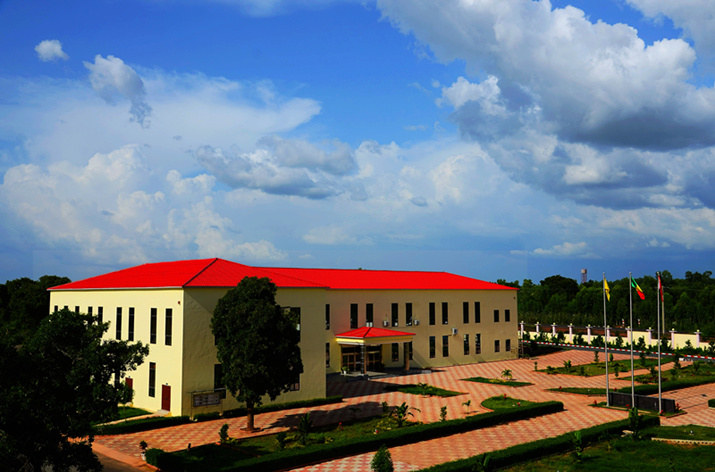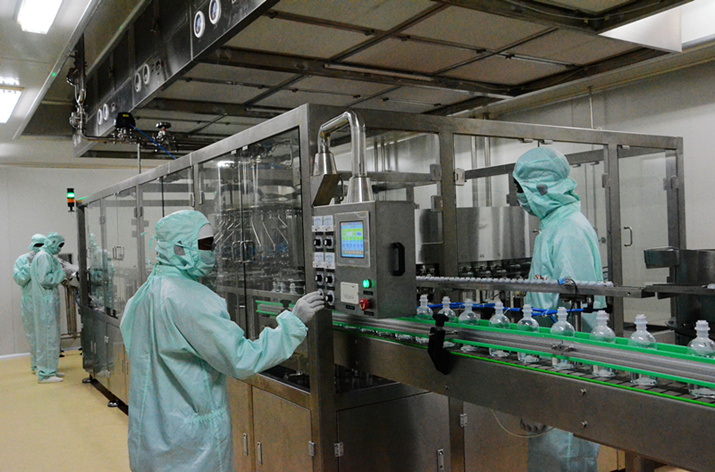|
||||||||||
| Home Nation World Business Opinion Lifestyle ChinAfrica Multimedia Columnists Documents Special Reports |
|
||||||||||
| Home Nation World Business Opinion Lifestyle ChinAfrica Multimedia Columnists Documents Special Reports |
| Business |
| Local Remedy |
| The building of Mali’s first drug factory by a Chinese company in 2015 marked a major turning point in the continent’s pharmaceutical industry |
| By Ge Lijun CHINAFRICA ·2017-11-08 |

Humanwell Healthcare (Group) Co. Ltd. compound
Not so long ago, Sanankoroba was a deserted place. But today, a top-grade drug factory proudly stands in this small town located nearby the capital Bamako, in southern Mali.
The factory is owned by the Malian branch of Humanwell Healthcare (Group) Co Ltd, a Chinese pharmaceutical company whose decision to enter the African market dates back to 2009. The company inaugurated its first drug factory on the continent in early 2015. As a result, all of West Africa has now access to its large range of drugs, in particular serums and syrups.
Covering a surface area of 69,000 square meters, the plant employs more than 200 Malians, including in executive positions. All of them have received training in modern pharmaceutical production techniques upon hiring.
“This plant will benefit our people by filling the gap of drug production in Mali,” said Mali President Ibrahim Boubacar Keita, at the plant’s inauguration.
Standard no longer a problem
Drugs are widely different from other fast-moving consumer goods, as their production is subject to the approval of competent authorities. “We have no choice but to comply with high standards and facilitate strict inspections of our company by the relevant departments,” said Li Wensheng, General Manager of Humanwell Healthcare in Mali.
From design to plant construction, from indoor environmental control - including air and water quality - to daily operations, everything must comply with some of the highest manufacturing standards.
Humanwell Healthcare now plans to support African countries in creating their own pharmaceutical standard. But this takes time and getting started without proper preparation could only hinder local pharmaceutical development in the medium to long term. “Rather than setting a local standard, we think it is better to raise standards and improve quality of drugs,” said Li.
To this end, the factory made a point of introducing concepts of modern industrial management in Mali. “This can only be beneficial to the plant, and also to all industrial sectors in Mali. This type of management is very different from that of small production workshops that prevailed in the past,” he added.
However, Humanwell Healthcare currently remains the only pharmaceutical factory in Mali, and the country is still dependent on imports to avoid the risk of a drug shortage. In addition, apart from the water used in the manufacturing process, raw materials and packaging are all imported from China. Production costs therefore remain high.
“In the future, we want to create an industrial chain around the plant to stimulate the local industry. For example, we could build a cardboard packaging plant to create more jobs and cut costs. It’s a sustainable development project,” said Li.

Local Malians employed at the drug company
Accelerating local production
According to data from the United Nations Economic Commission for Africa in 2016, the African pharmaceutical sector represents merely two percent of the global pharmaceutical market.
“Personnel and technology in Africa are far from being able to meet the demand for pharmaceutical industrialization at the moment. Using foreign capital is an immediate and effective solution,” Chen Si, Assistant Manager of the China Africa Development Fund (CAD Fund), told ChinAfrica. Together with Humanwell Healthcare, the fund has invested 270 million yuan ($41 million) to establish the branch in Mali.
In addition, to ensure further development of the pharmaceutical industry across the continent, an enabling environment should be put in place. This would include facilitating access to investment capital, protecting the interests of investors and attracting more local talent to the industry, added Chen. “It’s a win-win partnership approach.”
“About 97 percent of medicines in Africa are imported. Chinese companies can therefore play a major role as an accelerator to local production,” said Michel Sidibe, Executive Director of Joint United Nations Programme on HIV/AIDS.
To achieve this, said Sidibe, China has two options: on the one hand, Chinese companies should obtain approval from the World Health Organization Prequalification Program to be able to export to the African market. On the other hand, the CAD Fund should encourage more Chinese companies to establish factories on the continent, in order to develop local production capacities.
The Chinese Government already pledged $60 billion to support development projects on the continent during the Forum on China-Africa Cooperation's Johannesburg Summit in December 2015. Cooperation in the field of healthcare figured among the summit’s priorities, with China encouraging its companies to support African pharmaceutical production in order to facilitate access to medicines.
Comments to: glj@chinafrica.cn
| About Us | Contact Us | Advertise with Us | Subscribe |
| Copyright Beijing Review All rights reserved 京ICP备08005356号-5 京公网安备110102005860号 |